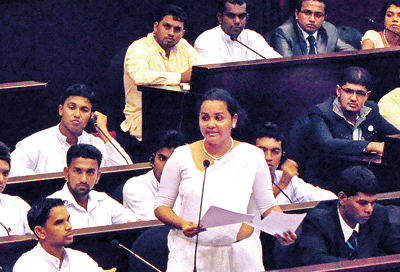Moving into an era of youth recognition
It was more to do with excitement than nervousness as Youth Senator Jayathma Wickramanayake took the floor to welcome the United Nations Human Rights Chief Navanetham Pillay to the second Youth Parliament of Sri Lanka. “Apart from a few seconds of nervousness, there was no fear. I knew that it was an opportunity to represent the youth of Sri Lanka and I wanted to tell her exactly what we felt,” says Jayathma.

Jayathma at the Youth Parliament Pic by Mangala Weerasekera
Jayathma’s passionate speech embodied the hardships faced by the youth demographic of the country and sent a strong message across. She spoke of the role of the youth in the development process – reiterating the need for forums such as the Youth Parliament itself to lead an era of youth recognition, saying that it is a “not a demonstrated value”, but rather “a political right”. “I hope that Ms. Pillay’s visit would be a catalyst of sorts, to empower youth leadership,” she said.
The UN Rights Chief duly commended Jayathma’s address and moved on to her insight of the ground situation commenting on problems such as the high rate of youth suicide and the problems of unemployment and underemployment.
The Sri Lanka Youth Parliament was first established in Sri Lanka in 2010, coinciding with the International Year for Youth. Determinedly pursuing the ‘youth-friendly’ agendas of the country, its primary mandate is to promote political participation and social cohesion within the youth of Sri Lanka.
“It hosts delegates from all parts of the island and thus gives a good representation of youth,” says Youth Senator, Senel Wanniarachchi. “Providing a platform to voice their opinions in a diplomatic way; the Youth Parliament is somewhat a messenger of the youth.” Both Jayathma and Senel are debate-hardened delegates who have been around since its inception and says that the Youth Parliament has come a long way since its beginnings.
The topic of debate in the first session was the ‘13th amendment of the constitution’, and Senel says that it promulgated an interesting phase of debate. The second session saw the youth parliamentarians giving their input for the National Youth Policy. Although the drafting of the policy took a lackadaisical approach over the past three years, this year it seems that the Youth Parliament has finally aroused the authorities to lend an ear. “It was at a standstill in the past, but the policy drafted at the Youth Parliament is soon to be presented to the cabinet,”says Jayathma.
There are 412 Youth Parliamentarians in total, with 332 members being elected through a democratic election process, while the newly integrated Senate has 77 members, selected through a highly competitive interview process. Special appointments make up for three more seats designated to represent youth in the disabled, indigenous and the minority sectors of the country.
It is structured into the following thirteen Ministries of Career Guidance, Citizen Relationships, Cultural Affairs, Education, Global Conservation, Human and Capital Resources, International Youth Co-operation, Media and Information Technology, National Youth Policy, Planning, Research and Innovation, Sports and Social Cohesion.
Each Ministry is appointed with a Minister and a Deputy Minister, and expected to work towards promoting its respective values amongst the youth through planning and implementing of successful projects and policies.
They are also expected to contribute towards the enrichment of Parliament discussions by providing expert knowledge related to their respective subjects. “Timely topics such as the use of social media and its reach to all parts of the country was debated upon and included in the youth policy, while traditionally sensitive topics such as sexual minorities were touched upon too,” says Senel. He believes that it shows a progressive move towards better things to come in the future and a break from the conservative mind-frame. “It helps that there are delegates from all districts because usually sensitive topics are limited to conversations within the capital. It needs to reach all parts of the island.”
“Everyone has an individual cause to voice out, and the Youth Parliament serves best for the youth of this country to be heard,” Senel adds.
comments powered by Disqus

